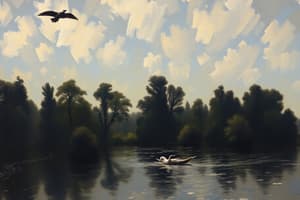Podcast
Questions and Answers
What was the primary cause of the decline of faith in reason during the late 18th century?
What was the primary cause of the decline of faith in reason during the late 18th century?
- The decline of Neo-Classicism
- The emergence of Romanticism
- The Industrial Revolution (correct)
- The Enlightenment Era
What type of poetry did the Pre-Romantic poets compose?
What type of poetry did the Pre-Romantic poets compose?
- Classical in form and romantic in content (correct)
- Classical in form and content
- Romantic in form and classical in content
- Romantic in form and content
What was the primary focus of Pre-Romantic poets?
What was the primary focus of Pre-Romantic poets?
- Sensibility and the natural world (correct)
- Mythology and fantasy
- Rationality and logic
- Social hierarchy and politics
Who introduced the term 'Pre-Romanticism' in 1912?
Who introduced the term 'Pre-Romanticism' in 1912?
Who is credited with anticipating the romantic idealization of nature?
Who is credited with anticipating the romantic idealization of nature?
How did the Pre-Romantic poets view nature?
How did the Pre-Romantic poets view nature?
What is the title of Thomson's finest work, according to most authorities?
What is the title of Thomson's finest work, according to most authorities?
What was a common theme in Pre-Romantic poetry?
What was a common theme in Pre-Romantic poetry?
What is a characteristic feature of Thomson's topographical poetry?
What is a characteristic feature of Thomson's topographical poetry?
What is a common theme among poets like James Thomson, William Collins, and Thomas Gray?
What is a common theme among poets like James Thomson, William Collins, and Thomas Gray?
Flashcards are hidden until you start studying
Study Notes
Pre-Romantic Poetry
- Emerged as a reaction to Neo-Classical poetry, but did not appear suddenly, rather it was a gradual shift through the works of precursors to Romanticism, known as Pre-Romantics.
Characteristics
- Pre-Romanticism as a literary term was first introduced in 1912 by Fortunat Strowski.
- The Pre-Romantic school was a period of transition between Neo-Classicism and Romanticism.
- The industrial revolution led to a dissatisfaction with the present situation, causing men to turn their attention to feelings and emotions.
- Nature became a real and living entity, existing as a person exists.
Themes and Features
- Everyday life, stories of poor people, and folk traditions became common themes.
- Poetry was strictly related to the poet as a person, reflecting their feelings, thoughts, and personal experiences.
- Melancholy and sadness were dominant feelings, connected to the historical and social context.
Poetic Features
- Poetry combined classical forms with romantic content, anticipating the romantic idealization of nature.
- It combined the forms of John Dryden and Alexander Pope with the themes of the Romantics.
- Topographical poetry was a unique feature, but with highly artificial diction.
Key Pre-Romantic Poets
- James Thomson, William Collins, Samuel Johnson, Oliver Goldsmith, Thomas Gray, Robert Burns, Thomas Percy, William Cowper, and William Blake were key forerunners of Romanticism.
James Thomson
- Was a forerunner of Romanticism in the age of Classicism.
- His poem, The Seasons (1726-1730; revised edition, 1744), anticipated the romantic idealization of nature and inspired William Wordsworth and Samuel Taylor Coleridge.
- His work, The Castle of Indolence (1748), is regarded as his finest work, consisting of two cantos in Spenserian verse about the pleasures and pitfalls of idleness.
Studying That Suits You
Use AI to generate personalized quizzes and flashcards to suit your learning preferences.




